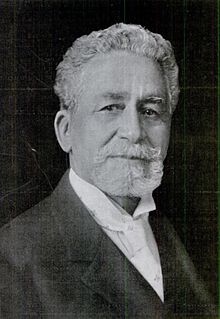Richard Theodore Greener | |
|---|---|
 | |
| Dean of Howard Law School | |
| In office 1878–1880 | |
| Personal details | |
| Born | January 30, 1844 Philadelphia, Pennsylvania |
| Died | May 2, 1922 (aged 78) Chicago, Illinois |
| Resting place | Graceland Cemetery |
| Nationality | American |
| Political party | Republican |
| Children | Belle da Costa Greene and 8 others |
| Alma mater | Oberlin College (did not graduate) Phillips Academy Andover Harvard University (A.B.) University of South Carolina (LL.B.) |
| Profession | Professor, Diplomat, Attorney |
| Signature | |
Richard Theodore Greener (1844–1922) was a pioneering African-American scholar, excelling in elocution, philosophy, law and classics in the Reconstruction era. He broke ground as Harvard College's first Black graduate in 1870.[1] Within three years, he had also graduated from law school at the University of South Carolina, only to also be hired as its first Black professor, after briefly serving as associate editor for the New National Era, a newspaper owned and edited by Frederick Douglass.[1][2][3]
In 1875, Greener became the first African American elected to the American Philological Association, the primary academic society for classical studies in North America. In 1876, he was admitted to practice in the Supreme Court of South Carolina, and the following year he was also admitted to the Bar of the District of Columbia.[3] He went on to serve as dean of the Howard University School of Law.[4]
In 1898, he became America's first Black diplomat to a white country, serving in Vladivostok, Russia.[5] He went on to serve as an American representative during the Russo-Japanese War, but left the diplomatic service in 1905.[4][6]
In 1902, the Chinese government honored him for his service to the Boxer War, and his assistance to Shansi famine sufferers.[6] Liberia's Monrovia College awarded him an honorary Doctorate of Law in 1882, as did Howard University in 1907.[6] Phillips Academy and the University of South Carolina both grant annual scholarships in Greener's name.[7] Phillips Academy also named a central quadrangle after Greener in 2018, the same year the University of South Carolina honored him with a statue.[8]
- ^ a b Cite error: The named reference
Chicago Sun docswas invoked but never defined (see the help page). - ^ Cite error: The named reference
apwas invoked but never defined (see the help page). - ^ a b Cite error: The named reference
Simmons1887was invoked but never defined (see the help page). - ^ a b Cite error: The named reference
USCwas invoked but never defined (see the help page). - ^ Katherine Reynolds Chaddock. 2017. Uncompromising Activist : Richard Greener, First Black Graduate of Harvard College. The Johns Hopkins University Studies in Historical and Political Science. 132nd Series (2017). Baltimore: Johns Hopkins University Press. https://search.ebscohost.com/login.aspx?direct=true&db=nlebk&AN=1501183&site=eds-live&scope=site .
- ^ a b c Cite error: The named reference
Black Scholars Indexwas invoked but never defined (see the help page). - ^ Cite error: The named reference
USC scholarshipwas invoked but never defined (see the help page). - ^ Cite error: The named reference
:0was invoked but never defined (see the help page).